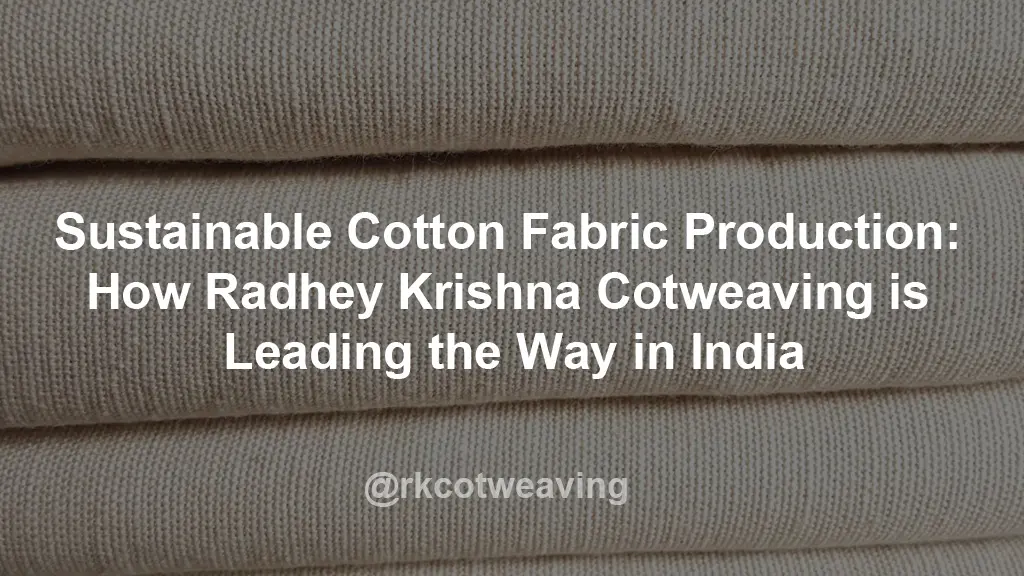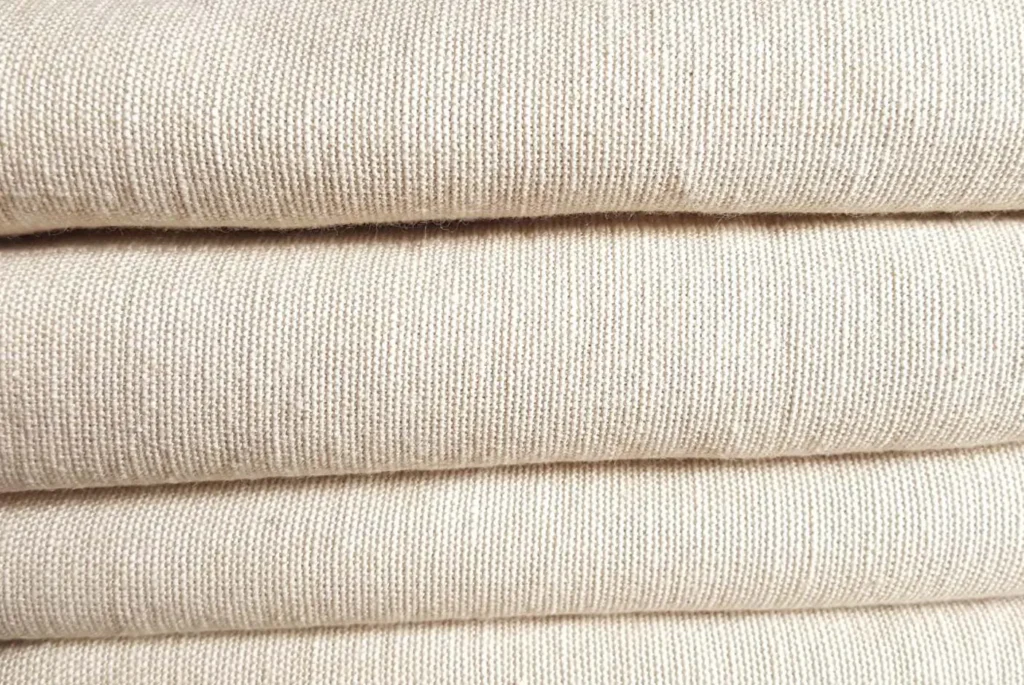- Home
- About
- Products100% Cotton Fabric100% Polyster FabricCotton Polyster BlendJUCO FabricHemp FabricChambray/Yarn DyedDyed Finished Fabric
Single Fill Duck
Army Duck Fabric
Numbered Duck
- 200 GSM Cotton Polyester Mix Canvas Fabric
- 220 GSM Cotton Polyester Mix Canvas Fabric
- 290 GSM Cotton Polyester Mix Canvas Fabric
- 295 GSM Cotton Polyester Mix Canvas Fabric
- 315 GSM Cotton Polyester Mix Canvas Fabric
- 375 GSM Cotton Polyester Mix Canvas Fabric
- 390 GSM Cotton Polyester Mix Canvas Fabric
- 470 GSM Cotton Polyester Mix Canvas Fabric
- Eco Weav
- Re Weav
- Certificates
- Contact Us

Sustainable Cotton Fabric Production: How Radhey Krishna Cotweaving is Leading the Way in India
In the fabric industry, the shift towards sustainability is more than a trend; it’s a necessity. Sustainable Cotton Fabric represents a pivotal change in this direction, offering an environmentally friendly alternative that doesn’t compromise on quality or comfort. This blog explores the essence of sustainable fabric, its unique characteristics, and how Radhey Krishna Cotweaving, a pioneering family-owned organization from Kishangarh, Rajasthan, is setting new standards in sustainable fabric production in India.
What is Sustainable Cotton Fabric?
The journey of Sustainable Cotton Fabric is rooted in a rich history that dates back to ancient civilizations, yet its relevance has never been more pronounced than in today’s environmentally conscious era. Sustainable cotton is cultivated with a mindful approach towards the environment, employing practices that reduce water usage, chemical inputs, and carbon footprint. This method not only preserves the soil’s health and biodiversity but also ensures that the fabric production process remains in harmony with nature.
Historically, cotton has always been a staple fiber, but the advent of industrialization introduced harmful farming practices. The sustainable cotton movement aims to revert these impacts by promoting organic farming, fair trade, and ethical labor practices. It’s a response to the growing awareness among consumers and manufacturers about the environmental and social implications of textile production.

Organic and Recycled Cotton: Pioneering Sustainable Fabric Solutions
In the realm of sustainable cotton fabric production, Radhey Krishna Cotweaving stands out by embracing both Organic Cotton Fabric and Recycled Cotton Fabric. Organic cotton fabric, cultivated without harmful chemicals, offers an eco-friendly alternative that supports a healthier ecosystem and promotes sustainable agricultural practices.
Recycled cotton fabric, on the other hand, redefines resourcefulness by transforming pre-and post-consumer cotton waste into new, high-quality textiles, thereby reducing landfill waste and conserving energy. Together, these sustainable fabrics embody Radhey Krishna Cotweaving’s commitment to environmental stewardship and innovative textile solutions, marking a significant stride towards a greener future in the Indian fabric industry.
Characteristics of Sustainable Cotton Fabric
Sustainable Cotton Fabric is distinguished by several key characteristics that set it apart from conventional cotton:
1. Reduced Environmental Impact: Sustainable cotton farming practices significantly lower water consumption and eliminate the use of harmful pesticides and synthetic fertilizers, leading to a smaller ecological footprint.
2.Quality and Durability: Contrary to the misconception that eco-friendly means lesser quality, sustainable cotton fabric often surpasses conventional cotton in durability and feel, thanks to the healthier state of the cotton plants.
3. Biodegradability: Being a natural fiber, sustainable cotton is biodegradable, ensuring that it doesn’t contribute to landfill waste at the end of its lifecycle.
4. Social Responsibility: The production of sustainable fabric supports fair working conditions and wages for farmers and workers involved in its cultivation and processing.
5. Energy Efficiency: From field to fabric, the entire process of producing sustainable cotton is designed to minimize energy consumption, contributing to a reduction in carbon emissions.
6. Enhanced Comfort: Sustainable fabric is known for its exceptional softness and breathability, making it extremely comfortable to wear in various climates. The absence of harsh chemicals in its production process also makes it ideal for sensitive skin.
7. Transparency and Traceability: A hallmark of sustainable cotton fabric production is the emphasis on transparency throughout the supply chain. Consumers can trace the origin of their garments back to the very fields where the cotton was grown, ensuring authenticity and ethical practices.
8. Water Conservation: Sustainable cotton practices often utilize rain-fed watering systems, reducing reliance on large-scale irrigation which can deplete local water resources. This approach significantly conserves water compared to conventional cotton farming methods.
About Radhey Krishna Cotweaving
At the forefront of India’s sustainable fabric revolution stands Radhey Krishna Cotweaving, a recognized sustainable fabric manufacturer in India. This esteemed family-owned entity has embedded quality and sustainability at the core of its operations. Situated in the historic textile hub of Kishangarh, Rajasthan, Radhey Krishna Cotweaving has emerged as the best Cotton Fabric manufacturer in India, championing the cause of sustainable cotton fabric.
With a robust team of 150 dedicated employees, Radhey Krishna Cotweaving is committed to delivering unparalleled quality. Their ethos is built around stringent quality standards, customer satisfaction, and a highly professional approach to fabric production. As a PAN India fabrics distributor, their influence spans across the country, setting benchmarks for quality and sustainability in the textile industry.
Final Thoughts
Sustainable Cotton Fabric is not just a product; it’s a testament to the industry’s potential to embrace eco-friendly practices without sacrificing quality. Radhey Krishna Cotweaving-Best Cotton Fabric manufacturer exemplifies this balance, leading by example in the sustainable fabric domain. As consumers increasingly lean towards environmentally responsible choices, the role of pioneers like Radhey Krishna Cotweaving becomes ever more crucial. Their dedication to sustainable cotton fabric production not only elevates their stature in the textile industry but also paves the way for a greener, more ethical future in fabric manufacturing.

